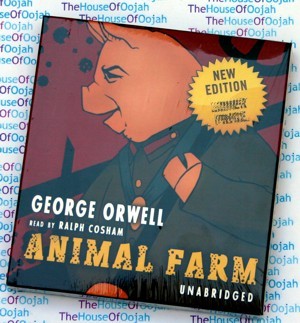Animal Farm - George Orwell - AudioBook CD Unabridged

Animal Farmby George Orwellread by Ralph CoshamGet Other George Orwell AudioBook CD click hereGet Other Classic AudioBook CD click here |
 |
Animal Farm - George Orwell - Audio Book CD Brand New : (unabridged) 3 CDs - 3 hours Old Major, a prize-winning boar, gathers the animals of the Manor Farm for a meeting in the big barn. He tells them of a dream he has had in which all animals live together with no human beings to oppress or control them. He tells the animals that they must work toward such a paradise and teaches them a song called “Beasts of England,” in which his dream vision is lyrically described. The animals greet Major's vision with great enthusiasm. When he dies only three nights after the meeting, three younger pigs—Snowball, Napoleon, and Squealer—formulate his main principles into a philosophy called Animalism. Late one night, the animals manage to defeat the farmer Mr. Jones in a battle, running him off the land. They rename the property Animal Farm and dedicate themselves to achieving Major's dream. The cart-horse Boxer devotes himself to the cause with particular zeal, committing his great strength to the prosperity of the farm and adopting as a personal maxim the affirmation “I will work harder.” About the Author George Orwell
On the outbreak of World War II, george orwell's wife Eileen started work in the Censorship Department in London, staying during the week with her family in Greenwich. george orwell also submitted his name to the Central Register for war effort but nothing transpired. He returned to Wallington, and in the autumn of 1939 he wrote essays for Inside the Whale. For the next year he was occupied writing reviews for plays, films and books for The Listener, Time and Tide and New Adelphi. At the beginning of 1940, the first edition of Connolly's Horizon appeared, and this provided a new outlet for george orwell's work as well as new literary contacts. In May the george orwells took lease of a flat in London at Dorset Chambers, Chagford Street, Marylebone. It was the time of the Dunkirk evacuation and the death in France of Eileen's brother Lawrence caused her considerable grief and long term depression. Between 1941 and 1943, george orwell worked on propaganda for the BBC. In 1943, he became literary editor of the Tribune, a weekly left-wing magazine. By now he was a prolific journalist, writing articles, reviews and books. In 1945, george orwell's 'Animal Farm' was published. A political fable set in a farmyard but based on Stalin's betrayal of the Russian Revolution, it made george orwell's name and ensured he was financially comfortable for the first time in his life. 'Nineteen Eighty-Four' was published four years later. Set in an imaginary totalitarian future, the book made a deep impression, with its title and many phrases - such as 'Big Brother is watching you', 'newspeak' and 'doublethink' - entering popular use. However, george orwell's health was deteriorating and he died of tuberculosis on 21 January 1950. During most of his career, george orwell was best known for his journalism, in essays, reviews, columns in newspapers and magazines and in his books of reportage: Down and Out in Paris and London (describing a period of poverty in these cities), The Road to Wigan Pier (describing the living conditions of the poor in northern England, and the class divide generally) and Homage to Catalonia. According to Irving Howe, george orwell was "the best English essayist since Hazlitt, perhaps since Dr Johnson." Modern readers are more often introduced to george orwell as a novelist, particularly through his enormously successful titles Animal Farm and Nineteen Eighty-Four. The former is often thought to reflect developments in the Soviet Union after the Russian Revolution; the latter, life under totalitarian rule. Nineteen Eighty-Four is often compared to Brave New World by Aldous Huxley; both are powerful dystopian novels warning of a future world where the state exerts complete control. Coming Up for Air, his last novel before World War II is the most English of his novels; alarums of war mingle with images of idyllic Thames-side Edwardian childhood of protagonist George Bowling. The novel is pessimistic; industrialism and capitalism have killed the best of Old England, and there were great, new external threats. In homely terms, Bowling posits the totalitarian hypotheses of Borkenau, george orwell, Silone and Koestler: "Old Hitler's something different. So's Joe Stalin. They aren't like these chaps in the old days who crucified people and chopped their heads off and so forth, just for the fun of it ... They're something quite new — something that's never been heard of before". |
Animal Farm - George Orwell - Audio Book CD |

 0 Items (Empty)
0 Items (Empty)